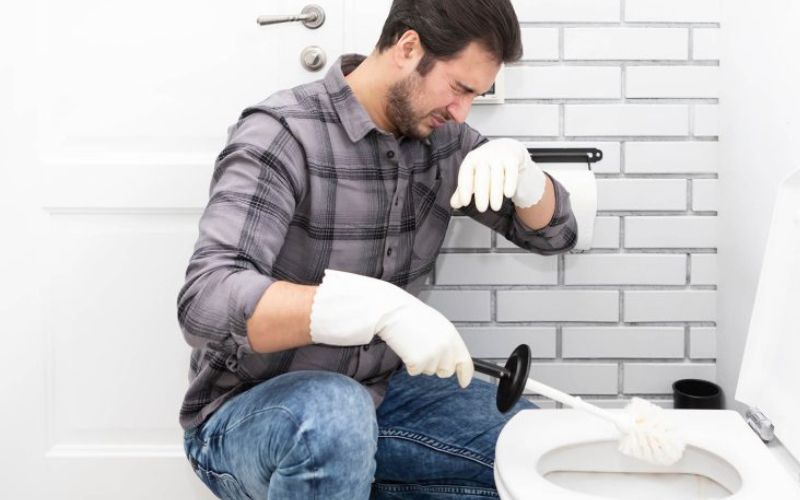Why Does My Toilet/Bathroom Smell Even After Cleaning?

You clean the tiles, fill up with cleaners, perhaps even ignite a freshener stick… yet, that pungent, unpleasant smell in your toilet remains. Frustrating, is it not?
The catch is, that smell isn't always caused by dirt. Sometimes it's your drains, sometimes the water, and sometimes even the plumbing you never even think to worry about. The fact is, there isn't one single offender when it comes to a smelly bathroom — there are a few. Sometimes, it even comes from issues that require professional septic tank cleaning.
The first step is to determine where the smell is originating. Below, we will go through the most usual culprits one at a time, so you can connect the dots and understand what's really going on.
Is That Rotten-Egg Odour Sewer Gas Sneaking In?
If your bathroom suddenly smells like rotten eggs, your first thought is usually “Did I miss a spot while cleaning?” However, if the rotten egg odour continues even when you've cleaned everything down to the grout and have left no surface free of products, you probably don't have dirt on your hands. It is a good chance that it's sewer gas that is leaking into your bathroom.
That rotten egg sulfur smell is usually hydrogen sulfide (H₂S) — a gas that is produced as trash decomposes in septic systems, plugged drains or sewer pipes, where there is no oxygen present for normal decomposition. The thing about H₂S is that we can smell it in very small concentrations (according to research, even minute amounts in the air will make you wrinkle up your nose). Persistent smells may indicate your septic system is overdue for septic tank cleaning.
Here's how you can know if sewer gas is to blame in your house:
- Smell location – Is it most pungent close to one specific drain, toilet, or floor trap? That's a clue.
- Timing – Does it happen when the bathroom hasn't been used for some time? A dry P-trap might be allowing gas to enter.
- Spread – Does the smell stay in one corner or does it move throughout the home? Localized odours typically indicate a plumbing problem; widespread odours may be septic or municipal sewer problems.
And here’s why you shouldn’t ignore it: even low-level exposure to H₂S can irritate your eyes, nose, and throat, and higher levels are downright dangerous according to public health experts.
So if the smell is stubborn and keeps creeping back, it’s a sign that your plumbing or septic system needs attention before it gets worse.
Could It Be Your Water Traps are Drying Out?
If your bathroom smells foul even after cleaning, one sneaky culprit you might not think about is your water traps drying out. Yes, that quiet U-shape of pipe under your sink or floor drain, when empty, can invite sewer gas right into your bathroom.
Here’s how it works (and how to tell if that’s what’s happening in your home):
- Every drain, shower, and fixture has a P-trap (or U-bend) whose job is to hold a small pool of water. That water forms a seal, blocking sewage gases from coming back up. If that water evaporates, the seal breaks and your bathroom becomes a shortcut for gas. This is a well-known plumbing fact: many guides list dry P-traps as a top cause of sewer gas smell inside homes.
- P-traps tend to dry out when the fixture is seldom used (guest bathrooms, floor drains, etc.), or in hot/dry conditions. Water wise plumping mentions that in humid or warm weather, evaporation can cause dry traps faster.
- Another twist: a blocked vent or poor ventilation can create negative pressure, causing your trap’s water to be sucked out or siphoned, especially when other fixtures drain. This makes the trap lose its seal even if it was full. Plumbing experts explain that blocked vents often “pull” the trap dry indirectly.
Indications that it could be a dry trap in your bathroom:
- The smell is the strongest near a particular drain, sink, or shower.
- The fixture sits unused most of the time (i.e. guest bathroom) and you catch the whiff when you enter.
- You flush the toilet or let some water run and it makes the smell go away (temporarily).
- You have cleaned everything else, and the smell comes back within a few hours.
If that describes your scenario, refilling or replacing the water seal on the trap may cure it instantly, no massive tools required.
What If the Smell Is Actually Coming from Your Water?
You may think the odour is emanating from your pipes or drains, but occasionally, it really begins upstream, within the water itself. Let's watch it in action, and see if it describes your circumstances.
Visualize this: you flip on the hot water faucet, the initial splash is like rotten eggs. But not the cold water. Or you smell the faucet when you're about to use the drain, and already get a whiff. If these occur, your water could be the culprit.
Here’s what experts say:
- Hydrogen sulfide (H₂S), the same gas behind that sulfur smell, can live in water. When water is released or heated, H₂S turns into gas and the odour becomes noticeable. According to state health agencies, this “rotten egg” smell in water is a well-known symptom when sulfide is present.
- Plumbing systems and old pipes can harbor sulfur-reducing bacteria, these feed on sulfate in water and produce H₂S. Over time, as water sits or moves slowly, the odour intensifies.
- Water heaters are a common trouble spot. Inside a heater, chemical reactions (especially involving magnesium rods) can release hydrogen sulfide when the water is warmed. That’s why hot water sometimes smells worse than cold. Plumbing experts often point to heater flushing or replacing the anode rod as a fix.
So, does this smell-from-water scenario match what you’re seeing at home?
- Do you catch the smell right away when opening a faucet, prior to it reaching the drain?
- Is the odour more pronounced in hot water than cold?
- Does it happen with more than one tap (kitchen, bathroom)?
- Do you utilize well water or have pipes with long runs?
If you said "yes" to one or more, this might account for your persistent bathroom smell issue and it's something to consider while you attempt solutions.
Final Word
Bathroom odours can be tricky to find, sometimes the water, and other times the pipes, but most of the time it is the septic system that is quietly working in the background. Air fresheners, or a clean-up will just mask the smell instead of tackling the problem.
One area that does not get enough attention is septic tank cleaning and maintenance. If a septic system is allowed to degrade, it will produce hydrogen sulfide and other gases that find their way into bathrooms - this is where that iconic “rotten egg" smell comes from. Routine maintenance really pays off in this department.
Bioclean provides a line of enzyme-based septic tank cleaning powder that breaks down organic waste, diminishes sludge buildup, and manages odour naturally. These biodegradable products do not need to be terrifying chemicals that work against your septic versus with it. With IAPMO-certified formulas, Bioclean supports households managing and maintaining healthy septic systems, whether you are on day one or restoring balances years later.
So next time bathroom dirt lingers, please do not just cover it up. Take a look for yourself, fix the underlying issue, and treat your septic system like the delicate mechanism it is.




